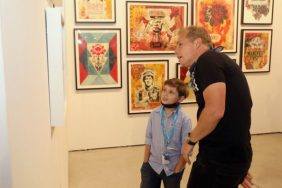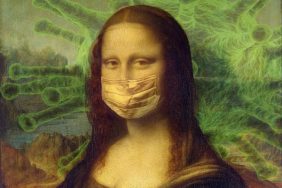Artist Jennifer Korsen grew up in the Valley, but her heart beats throughout Los Angeles. Like the freeways and streets that connect every area of this sprawling city, through her work Korsen uses the heart, an organ every living human intimately knows, to discuss ongoing themes of communication and connection. The L.A.-based artist, who prefers large-scale murals and woodcut interventions in abandoned phone booths, places her work in public places where it can become an impetus for discussion among strangers and friends alike.
“The heart is one of those symbols that everyone can relate to, and it’s something that changes over time,” Korsen says. “You could be looking at a heart one day and think, ‘oh, this is power, this is connection,’ and then based on your experiences another day it could be something sad if you’re feeling heartbroken.”
[springboard type=”video” id=”1659371″ player=”cr057″ width=”914″ height=”514″ ]
Most Angelenos have encountered a Jennifer Korsen work without realizing it. Her hearts cover walls and old public phone booths throughout Los Angeles, creating a circulatory system all their own. The other thing that viewers probably wouldn’t notice about Korsen’s hearts are their visible imperfections.
“My hearts are anatomically incorrect,” she says. “It started as a mistake — I was hurrying through a drawing I was doing, and I assumed something was a valve when it was actually an arch. My heart has an extra hole in it. No one else draws a heart like that unless they made a mistake.”
Some of her hearts mark a specific place in Los Angeles. A heart at 7th and Mateo in downtown L.A. covers a much coveted wall space that’s popular among the city’s muralists and street artists. “Heart of Winston Street” is spray painted at the corner of Winston and Main Streets in downtown Los Angeles. It appeared in 2014, but like many of her street art pieces, often times they’re painted over, worn down or removed. Another very visible heart appears on a wall outside of Angel City Brewery, a very public meeting place, an artery of L.A.’s booming downtown.

Photo by Colors In LA.
Her hearts also appear prominently in her phone booth project. Rather than use typical street art techniques like wheat pasting or stickers, with this project she decided to take a less conventional route by creating multi-layered woodcuts with messages on them such as “Have you seen me?” and placing them into abandoned, obsolete phone booths that nevertheless remain standing as if it were 1993. A red woodcut with a black heart was installed in an abandoned phone booth in Venice, a yellow one was planted in Van Nuys, and a speckled heart popped up in a black phone booth downtown. Korsen installed some 50 hearts across the city.
“In the 80s and 90s if you wanted to talk to somebody you really had to walk to a payphone. You couldn’t Google it. You just had to find a payphone,” she says. “I also think it’s cool and unexpected that, if you’re walking down the street and see one of my hearts in a phone booth at eye-level, you have to stop and wonder to yourself: ‘What is this? Who put this here?’”
Also: Wall To Wall | Vanessa Prager: The Art of Excess
For Korsen, this added a level of subtle, passive communication in a place where active communication used to occur. The novelty and clear messages coupled with the recognizable symbol of the heart also get a second life on social media. They are immediately and easily captured with the snap of a camera.
“Social media has been really valuable especially in terms of the payphone project,” says Korsen. “People would Instagram them. They have little messages in them that I would see people post. They would post and tag their friends, writing things like ‘this made me think of you.’ It made me feel like my art has a place in other peoples’ connections and communication.”
Her website is appropriately named HumansMakeArt.com. Korsen’s work has been shown nationally and abroad, from Germany and the UK to New York and Portland. Even more eyes happen upon her work when it appears in TV shows and films that are shot on-location, and happen to capture her hearts in the frames. She is also active in the art world, with representation at Lab Art, Gabba Gallery and Hive Gallery.

Photo by Jake Woods.
In addition, Korsen does commissions for clients, ranging from Toms and Whole Foods to individual bands and artists. She admits that one of her favorite commissions is a huge painting of a monster on the side of a bus that she did for the band Lonely Parasite Traveling Circus. Korsen prefers large over small, both for the benefits of more viewership and the fact that she can physically get into the act of creating. She works intuitively, which is something she has always done.
Korsen was interested in art ever since she was a little kid. She found herself drawn to art toys like hama beads and puffy paints, and once painted over one of her dad’s antique cabinets. When her mother passed away at a young age, Korsen turned further toward art — it offered her a sense of control in an otherwise unruly world. As a teenager, she got involved in art therapy, an essential tool for feeling that she had a voice. At the same time, art was something that she could always escape into, that made her feel happy, and that gave her space to connect with herself.
Like art making, painting large and in public wasn’t something that she intended to do —it just happened, and once she started she couldn’t stop.
“Painting large is really powerful,” she says. “You get to use your whole body, put your body into all the motions. It’s a release, and it’s definitely a workout.”
In an eerie twist of events, considering her obsession with the heart, Korsen recently discovered that she has some heart issues.
“Very recently I found out that I have some issues with my heart, so that kind of made it take on a new meaning, but that was not why I started doing it,” she says. “That’s a very recent thing. [The heart] is the symbol of life — it’s the first thing they look for to see if someone is having a baby, it’s the last thing they look at to see if someone has passed away.”








